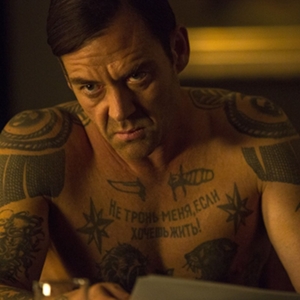
The Equalizer (2014)
Cast: Denzel Washington, Marton Csokas, Chloë Grace Moretz
Director: Antoine Fuqua
Genre: Action | Crime | Thriller
Country: USA
Editor’s Notes: The Equalizer opens in wide theatrical release today, September 26th.
A little remembered ‘80s TV series staring a barely remembered actor would seem like a relatively poor candidate for a big-screen revival, but that didn’t stop the producers behind Denzel Washington’s latest movie-star effort, The Equalizer. With his Training Day director, Antoine Fuqua (Olympus Has Fallen, Brooklyn’s Finest, Shooter, Tears of the Sun), at the helm, there was never any doubt that – whatever The Equalizer’s might offer on a narrative or emotional level – the action scenes/set pieces would not disappoint (they don’t). Only moviegoers eager for yet another vigilante-centered, ultra-violent time at their local multiplexes, however, will look beyond The Equalizer’s bloated running time, problematic themes, or its exploitation-level indulgence in violence for violence’s sake.
Fuqua lingers over throat slashing, knife wound, and power drill to the back of the head.
When we first meet Washington’s character, Robert McCall, he’s leading a life of quiet contemplation, not quiet desperation. He’s all but retired from whatever mysterious past he’s left behind – permanently in his eyes, non-permanently in the audience’s – purposely engaging in a well-ordered, if dull, daily routine filled with work at a Home Depot-inspired big-box hardware store, Home Mart, and a post-prandial, night-time read at a local diner. A method man, McCall is steadily working his way through a “100 Books Everyone Must Read” list, marking him as a man out of time (if nothing else). McCall’s reading habits, however, serve as a conversation starter with a teenage prostitute, Teri (Chloë Grace Moretz), who also frequents the diner. McCall slowly warms to her, hesitant to engage on anything but a superficial level.
 McCall’s quiet, ascetic life, however, doesn’t last long. If it did, moviegoers would be seeing an entirely different film, a character study involving a middle-aged man stirred from complacency into doing something, anything to prove his worth to himself or the outside world. Here, however, McCall makes a considered, deliberate choice to rescue Teri, Taxi Driver-style, from the vicious Russian pimps who savagely beat her after she defies them. McCall offers them money and a way out of a violent confrontation, but they vastly underestimate McCall or his abilities – abilities left unexplained by Richard Wenk’s otherwise bloated, overlong screenplay, with the exception of vague references to McCall’s super-secret spy work (unsurprisingly more Bourne than Bond) – unsurprisingly leading to their swift, gore-filled deaths. No one can argue The Equalizer skimps on full-frontal depictions of McCall’s bloody, close-quarters handiwork (because it doesn’t).
McCall’s quiet, ascetic life, however, doesn’t last long. If it did, moviegoers would be seeing an entirely different film, a character study involving a middle-aged man stirred from complacency into doing something, anything to prove his worth to himself or the outside world. Here, however, McCall makes a considered, deliberate choice to rescue Teri, Taxi Driver-style, from the vicious Russian pimps who savagely beat her after she defies them. McCall offers them money and a way out of a violent confrontation, but they vastly underestimate McCall or his abilities – abilities left unexplained by Richard Wenk’s otherwise bloated, overlong screenplay, with the exception of vague references to McCall’s super-secret spy work (unsurprisingly more Bourne than Bond) – unsurprisingly leading to their swift, gore-filled deaths. No one can argue The Equalizer skimps on full-frontal depictions of McCall’s bloody, close-quarters handiwork (because it doesn’t).
That alone makes for a singularly unpleasant, even a repellent one, but Fuqua, a filmmaker with reactionary tendencies (c.f., Olympus Has Fallen, Tears of the Sun), indulges his fetishistic obsession with depicting violence in its most extreme forms. By the climax, McCall, given implicit, if not explicit, permission to use his “unique set of skills” on the Russian henchman and the sociopathic, military-trained enforcer, Teddy (Marton Csokas), sent by the now-dead pimp’s Russian-based gangster boss. By then, The Equalizer has made the complete transition from vigilante revenge-film to full-out slasher film, with McCall as the Jason-like slasher (he’s also inspired by another ‘80s TV series, MacGyver). Fuqua lingers over throat slashing, knife wound, and power drill to the back of the head.
The Equalizer takes more than just the title, character name, and the character’s background from the TV series. It also takes the regressive, reactionary attitudes that underpin vigilante crime-thrillers from the early 1970s through the present …
Nothing McCall does in The Equalizer, of course, changes his status as unambiguous hero, secular savior, and avenging angel. His methods might be as brutal and violent as Teddy’s, but he’s on the side of downtrodden, the oppressed, and the repressed, not a billionaire Russian oligarch/crime boss and his sub-human minions. Then again, that’s nothing new. The Equalizer takes more than just the title, character name, and the character’s background from the TV series. It also takes the regressive, reactionary attitudes that underpin vigilante crime-thrillers from the early 1970s through the present (as does last week’s repulsively misogynistic A Walk Among the Tombstones).
Audiences certainly won’t care. They won’t question what McCall represents or means as a character, but embrace him because the character fundamentally reflects the American psyche and its obsession, if not outright approval, of violence as a legitimate means to resolve conflict and violent men, guided only by their consciences and moral compasses, to always do the right thing. More importantly, they’ll embrace The Equalizer because it’s Denzel being Denzel, bringing his carefully cultivated, ever righteous screen persona to a film and character that minus his involvement and arguably Fuqua’s would be destined for a straight-to-VOD release.
Only moviegoers eager for yet another vigilante-centered, ultra-violent time at their local multiplexes, however, will look beyond The Equalizer’s bloated running time, problematic themes, or its exploitation-level indulgence in violence for violence’s sake.



